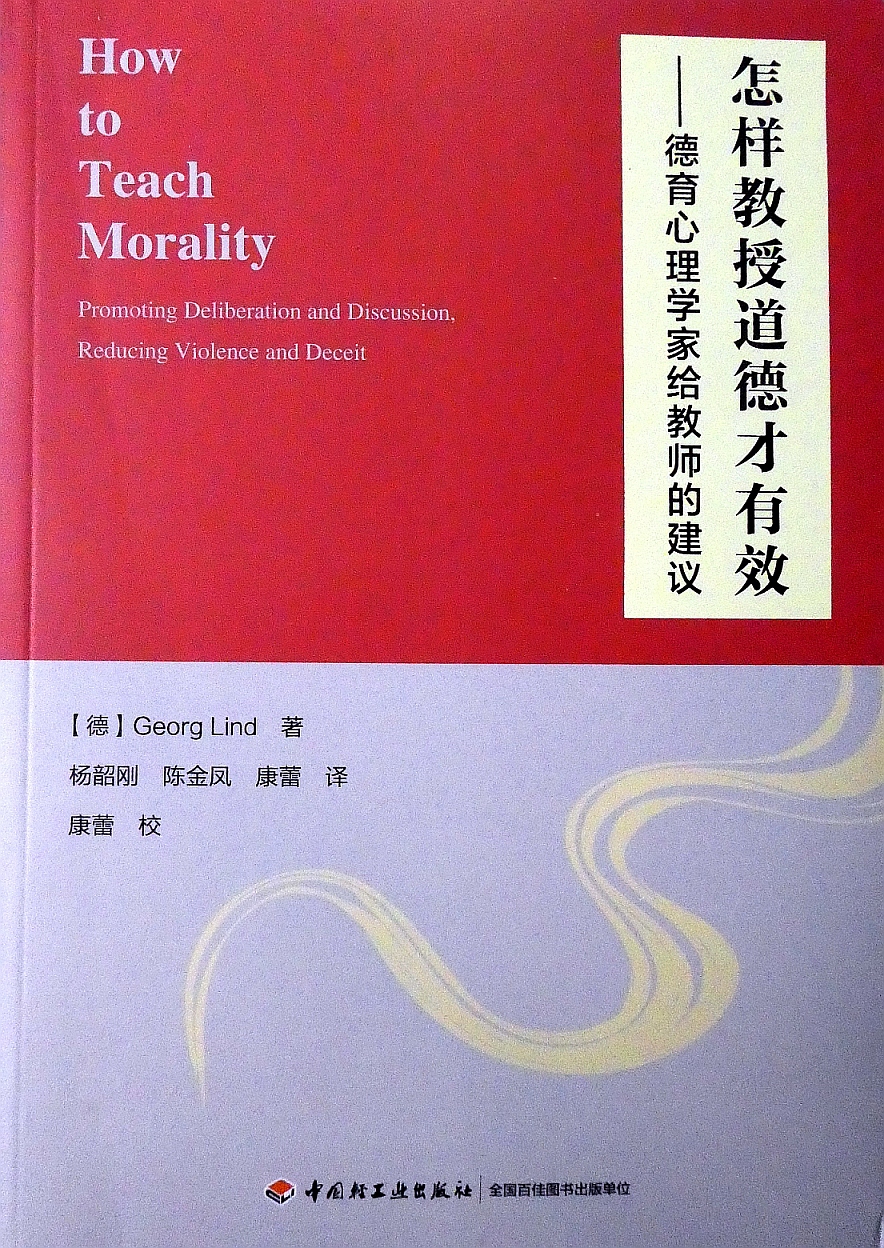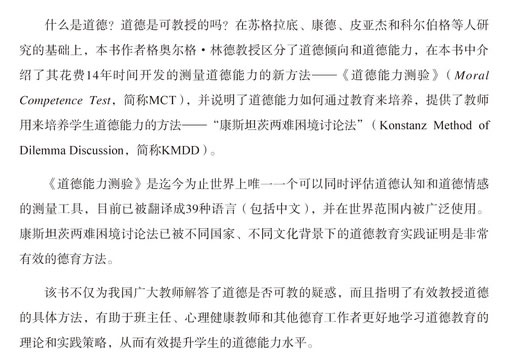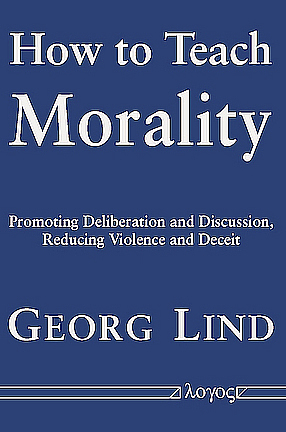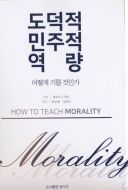

English edition:
Sample chapters for download:Introduction
Chapter 4 (Moral Competence Test)
Lectures on video:
The relevance of moral competence
How to measure moral competence
Published:
Korean translation by Park Gyun Yeol. Publisher: Yangseogak, Seoul.
Deutsche Bücher:

This is the first book in Chinese on moral competence theory, measurement and education:
How to Teach Morality. Promoting Deliberation and Discussion, Reducing Violence and Deceit (and Power).
Translation by Yang Shaogang, editing by Kang Lei
Publisher: China Light Industry Press, Beijing.
------------
Reviews and testimonials (English edition):
"In this book, Lind offers a solid conceptual argument, as well as useful tools to carry out moral education in schools, product of his many years of reflection, research, training and intervention in various educational contexts. In a scenario like the Peruvian, in which the systematic reflection on the philosophical and psychological bases of moral education is still scarce, Lind's work constitutes without a doubt a relevant contribution that deserves to be known by all those interested in this important pedagogical area.... What must be recognized, [...], is that this book offers epistemological and conceptual foundations for it, and offers interesting clues to rethink, debate, and carry it out in the classroom with a rigorous and scientific look." [more] (Revista Peruana de Investigación Educativa 2017, No. 9, pp. 235-238. Google translation)
—Dr. Susana Frisancho, Profesora Principal, Departamento de Psicología, Pontificia Universidad Católica del Perú. Web: http://www.pucp.edu.pe/profesor/susana-frisancho-hidalgo/
"The definitive, research-based book on morality teaching with highly useful applications to educational practice. Highly recommended."
—Dr. Herbert Walberg, Emeritus Professor of Education and Psychology, University of Illinois at Chicago, and editor of "Psychology and Educational Practice."
"It is a wonderful book about detail and accuracy, in an easy to follow language. It is a wonderful book about detail and accuracy, in an easy to follow language." more
—Dra. Semíramis Llanos Cobos, Facultad de Medicina Norte, Universitdad de Chile, Temuco, Chile.
"Of special interest, in my view at least, are the parallels (and distinctions) [Lind] draws between moral education and civic education. ... Lind argues, 'morality (and hence moral education) is a prerequisite for a successful democratization of school and society.' " more
—Dr. Thomas E. Wren, Professor of Ethics, Loyola University, Chicago. Author of "Caring About Morality: Philosophical Perspectives in Moral Psychology."
‘‘We all want to be ‘good’ [Lind] contends -- it’s part of our human inheritance. But being morally competent, [he] shows, is enhanced and nourished when educators develop propulsive learning opportunities for students to practice and develop. Moral competence can be taught. ...
He sees as a central goal of education in a democracy the creation of citizens, not 'subjects,' and therefore, a responsibility for education to focus time and resources and energy on developing the ability to solve problems and conflicts through thinking and discussion rather than violence, duplicity, and power. In that regard moral competence must be taught. ...
Moral reasoning and ethics are daunting texts any way you look at it--the principles of right and wrong, a discipline dealing with good and evil, a branch of philosophy stretching back to antiquity, a manual for right living, and on and on--ethics intimidates. But Georg Lind brings it down to earth and offers tools to make moral reasoning accessible and useful. ...
Moreover, to presume to talk of ethics isn't just abstract, high-minded, and dense, it also implies a rectitude nobody can sustain and very few--certainly not me--want even to aspire to. It gestures, then, toward self-righteousness. Is my life do damned exemplary? Am I in any position to pronounce moralizing judgments, to strike an authoritative pose and to scold? Am I really so good? Ethics terrorizes. And once again, Georg Lind takes away the fear.’’ (The whole review to appear in: Education Review, http://edrev.asu.edu/index.php/ER/article/view/2184%20.) ... PDF
—Dr. William Ayers, Distinguished Professor of Education (retired), University of Illinois at Chicago. Author of "To Teach. The Journey of a Teacher."
“The significance of Lind’s book can hardly be overstated. It contributes both (a) to advancing psychological research world-wide and (b) to the application of psychology in the much neglected field of educational instruction, where psychological application is often confined to testing and counseling. The book has global significance because, as I already noted, it is based on universal moral ideals and principle.
Moreover, Lind’s Moral Competence Test is culturally valid because it uses, as he outlines in his book, participants’ own moral orientations as standards for scoring instead of external, culturally specific standards.” ... more
—Dr. Shaogang Yang, professor of psychology at the Guangdong University of Foreign Studies in Guangzhou, P.R. China
“Lind’s mastery of the history and philosophy of morality and moral education is quite apparent, as he quotes voluminously from sources ranging from Socrates, Kant, and Spinoza to Piaget, Kohlberg, and Pinker. Fortunately, unlike many authors in his field who write dense prose seemingly designed to impress or intimidate non-expert readers, he writes of the complex issues bound up in morality in a beautifully clear and persuasive manner.” ... more
—Dr. Richard M. Felder, Hoechst Celanese Professor Emeritus of Chemical Engineering at North Carolina State University. Co-author of “Teaching and Learning STEM: A Practical Guide” (Jossey-Bass, 2016)
“Congrats on your book!! You have made a wonderful contribution to the field, and for, importantly, society!!”
—Paul R. Carr, Ph.D., Professeur Département des sciences de l'éducation Université du Québec en Outaouais (UQO). Co-editor of "Democracy and decency. What does education have to do with it?"
“Dr. Lind’s experimental and educational approach to morality is unique worldwide.”
“Georg Lind's former books [...], as well as a large number of research papers leave no doubts that moral competence is an operational cognitive skill. Its growth [...] can be investigated and even measured with experimental measuring instruments, [...] in particular, with the Moral Competence Test which has been perfected and applied for 40 years by Georg Lind.” (p. 322) more
—Dr. Ewa Nowak, Professor of Philosophy and Ethics, Adam Mickiewicz University, Poznan, Poland. Author of “Experimental ethics.”
“Georg Lind and his colleagues have pioneered an empirical tool, a test of an individual’s moral competence. [...] How to Teach Morality is an encouragement to actively engage our peers and children in moral education.” more
—Dr. Robert Hepach, Associate Professor, Erziehungswissenschaftliche Fakultät of Leipzig University; formerly Max Planck Institute for Evolutionary Anthropology, Leipzig, Germany.
“Dr. Georg Lind’s work offers profound insights into the true nature of morality, a thorough theoretical analysis, extensive empirical research, convincing arguments and a unique practical way – the KMDD method to foster and sustain moral competence.”
—Dr. Roma Kriaučiūnienė, Professor and Director of the Institute of Foreign Languages of Vilnius University, Lithuania.
“In moral education this book is significant in giving a practical and reasonable way of moral reasoning through moral dilemma discussion.”
—Dr. Gyun Yeol Park, Professor of Moral Education, Gyeongsang National University, Republic of Korea.
"This book is essential for any academic interested on democracy, peace and morality. Its clarity and
theoretical solidity makes it very useful and helpful." more
—Dr. Jairo Ordóñez, Professor at the St. Tomas University, Bogotá (Colombia).
“An important book.”
—Dr. Dr. Jan Ilhan Kizilhan, Professor at Baden-Wuerttemberg Cooperative State University, Head of the Department of Mental Health and Addiction.
“Insgesamt bietet das ganze Buch eine hoch interessante Lektüre und ermöglicht dabei, einen Bogen zwischen fundiertem Wissen und praktischen Erfahrungen zu spannen. Letztlich, so Lind, können Menschen fast jeden Alters Moralkompetenz lernen oder weiterentwickeln, jedoch unter der Voraussetzung, dass dafür gesorgt wird.”
[In sum the book offers an extremely interesting reading and allows, therewith, to force a bridge between founded knowledge and practical experiences. Ultimately, Lind says, people of nearly all ages can acquire moral competence or develop it further on, but only under the condition that it is fostered. My transl. GL]
—Fiona Ross, lecturer, Scottish Area Studies at the University of Konstanz.
“Ihre interessanten Forschungsergebnisse sind auch mir hilfreich. Ich werde sie gerne
in geeigneter Weise in meine weiteren Überlegungen und Gespräche zum Thema Bildung einbeziehen.”
"Your interesting research findings are also helpful for me. I
would like to incorporate them into further deliberations and discourses on education." transl. GL)
—Johannes Rau, Federal President of Germany. Letter to the author regarding his book "Ist Moral lehrtbar (Can morality be taught)?".
“Thanks to Georg Lind and his book, we know that we can teach morality. And that’s important.”
—Rainer Erlinger, Contributor to the Süddeutsche Zeitung Magazin, and author of "Höflichkeit. Vom Wert einer wertlosen Tugend." [Courtesy. About the value of a valueless virtue.] Frankfurt am Main: Fischer Verlag.
“Whoever is interested in the training of students, teachers and educators of all kinds will find appropriate information for primary, secondary and post-secondary education and beyond.”
—Dr. Wilhelm Peterßen, Professor emeritus of Education, University of Education at Weingarten, Germany. Author of "Lehrbuch der Allgemeinen Didaktik". [Text book of general didactics.]
“Dr. Lind’s threefold combination of theory, practice, and empirical research might become the standard for pedagogical developments which do not only claim, but demonstrate hands-on, and show proof for effects.”
—Dr. Sibylle Reinhardt, Professor emeritus of Social Studies, University of Halle, Germany. Author of “Teaching Civics.” more
"The book is written in a down-to-earth way and very readable. It contains a wealth of information and practical hints, which can be used in the class and in seminars. If you ever wanted to convene a dilemma discussion -- here you can find guidelines. If you need sample dilemma stories, the book offers them. If you want to know more about moral judgment competence, moral development and empirical studies on this -- Lind's book helps you. Moreover, in the book Lind's conviction shines through that it is important and laudable to risk more democracy in the school. In sum a very recommendable book." (transl. by GL)
—Dr. Gislinde Bovet, Staatliches Seminar für Didaktik und Lehrerbildung (Gymnasium), Rottweil.
"Lind understands moral education not as setting 'correct' values through indoctrination but as providing learning situations, which stimulate people's autonomous reflection.
For more than forty years the educational researcher Georg Lind, Konstanz, worked -- theoretically as well as empirically -- on the question how to measure jugdement competence in the domain of values and how to promote it. I know only few scientists who have pursued for so long and in such a focused way a socially so important question -- a great life-time achievement." (transl. by GL)
—Dr. Hans Brügelmann, Professor em. of primary education, University Siegen.
"For searching, change-ready educators, this book show clearly a way to new horizons. Reform-tired, though still interested educators should accept Lind's offer and dare to foster moral-democratic education. Those, who have already unterstood the necessity of educational efforts and work with various methods of moral-democratic education will discover that they miss essential things. The "unwilling" educators, too, should read the book in order not to miss an opportunity. Dr. Georg Lind easens the beginning of moral-democratic education, because he provides als necessary theoretical and practical foundations." (transl. by GL)
—Hans Werner Henk, Wuppertal, former principal of the Johann Gutenberg-Realschule in Langenfeld, which participated in the project Democracy and Education in Schools (DES) (Lind & Raschert 1987).
Reviews of "How to Teach Morality"*
Dr. Shaogang Yang, Professor of Psychology at the Guangdong University of Foreign Studies in Guangzhou, P.R. China:
“Dr. Lind is a truly international psychologist. His research into moral competence is based on universal moral principles. His new Moral Competence Test has been translated and validate in 39 different languages. He lectures and teaches workshops around the world. His new book How to Teach Morality is based on the results of his four decades of psychological research and on twenty years of application of his new methods of moral education in many countries.
Dr. Lind presents in his book several novel ideas. Some of his ideas are taken from experimental psychologists. But he has concretized and developed them into workable research and education methods. To mention only three central ones in his book:
- He developed the first objective test of structural properties of human behavior, which could so far only be assessed through subjective methods of interviewing and scoring: the Moral Competence Test (MCT), now being used world-wide in research and program evaluation. This method can be used in many other areas as well. It is absolutely new and a breakthrough for psychological research.
- Dr. Lind took up Jean Piaget’s and Lawrence Kohlberg’s notion of a cognitive-structural aspect of morality and concretized and named it as “moral competence.” This he defines as the ability to solve problems and conflicts on the basis of moral principles through deliberation and discussion instead of violence and deceit. This definition proved to be very fruitful for research and application.
- On the basis of his psychological research Dr. Lind developed a new method of fostering moral competence in humans age 8 and older in all countries and cultures. His Konstanz Method of Dilemma-Discussion (KMDD) is based on Kohlberg’s dilemma discussion. But he improved it on the basis of continuous self-evaluation. While Kohlberg gave up this method because teachers did not take his method up, Lind’s KMDD is spreading in many countries.
The significance of Lind’s book can hardly be overstated. It contributes both (a) to advancing psychological research world-wide and (b) to the application of psychology in the much neglected field of educational instruction, where psychological application is often confined to testing and counseling. The book has global significance because, as I already noted, it is based on universal moral ideals and principle.
Moreover, Lind’s Moral Competence Test is culturally valid because it uses, as he outlines in his book, participants’ own moral orientations as standards for scoring instead of external, culturally specific standards.
The global nature of Dr. Lind’s book is already mentioned in my previous comments. I like to add that he has been invited to many international conferences and has worked with children and adult learners as well as with teachers and professor in many different countries. Also in my country, China, he is very successful. Two of our assistant professors attended his workshop-seminars in Konstanz and obtained a “KMDD-Teacher” certificate, which he offers. His new book is the first in English and makes his work even more assessable for non-German speaking audience.
I share Prof. Ewa Nowak's judgment who writes, 'Dr. Lind’s experimental and educational approach is unique worldwide.' He has a very deep knowledge of experimental psychology and has used this knowledge to design the first objective test of the structural aspect of human behavior. In his book he shows convincingly that these aspects are very important but cannot be assessed with tests based on classical test theory or on modern testing methods like Item Response Theory, Rasch scaling and Latent Trait assessment. While subjective methods (like clinical interviews) tap this aspect their subjectivity is rightly criticized. In Lind’s work, theory, method and application are perfectly aligned.
Even though Lind’s book has a scientific basis it is written in a clear language. It contains many practical examples which help to understand his sometimes unusual thoughts. It is written mainly for teachers in all fields but also for researchers and scholars who will find quotes of many little known studies and a great wealth of references. Because of the ambiguity of many psychological terms, Lind decided not to add a subject index but a glossary in which his central terms are clearly defined. I am sure that the book will be well received.
I think that Lind’s book will stimulate a paradigm shift in psychology as a science and practice. Because his new method of psychological measurement lets psychologists now study the structure of personality objectively, a lot of structural theories and hypotheses can be tested empirically now for the first time. He demonstrates this in his book by testing Piaget’s theory of affective-cognitive parallelism which is theoretically well founded but has never been adequately tested before because of a lack of appropriate data. Lind’s data prove Piaget’s ideas very well.”
Dr. Richard Felder, Hoechst Celanese Professor Emeritus of Chemical Engineering at North Carolina State University. Co-author of “Teaching and Learning STEM: A Practical Guide” (Jossey-Bass, 2016):
“How to Teach Morality is an extraordinary book. It deals with several important and perplexing questions that philosophers, theologians, psychologists, and educators have wrestled with for millennia. What is morality? Can it be taught? If so, how and by whom? Professor Lind has devoted decades to exploring these questions from both theoretical and applied points of view. He has concluded that morality can and should be defined as a teachable and assessable competence, and he has developed a moral education system (the Konstanz Method of Dilemma Discussion) and tested it with populations ranging from students to prisoners in countries on several continents. Using an instrument he developed and validated to assess moral competence, he consistently observed significant and—importantly—persistent growth in moral competence in the populations he studied.
Lind’s mastery of the history and philosophy of morality and moral education is quite apparent, as he quotes voluminously from sources ranging from Socrates, Kant, and Spinoza to Piaget, Kohlberg, and Pinker. Fortunately, unlike many authors in his field who write dense prose seemingly designed to impress or intimidate non-expert readers, he writes of the complex issues bound up in morality in a beautifully clear and persuasive manner. He also makes a powerful case for the strong current need for effective moral education, drawing excellent examples from recent world history. I have no doubt that widespread adoption by educators of the methods Lind lays out in the book would make life better for a substantial portion of the world’s citizenry. I hope the right people read it.”
Source: Amazon.co.uk customer reviews.
Thomas E. Wren Ph.D., Professor for Ethics, Loyola University, Chicago
In his How to Teach Morality Professor Lind brings together the theory and practice of moral education, drawing from classical and contemporary ethical theory, cognitive development theory, and moral psychology. For instance, he develops his concept of "moral competence" by drawing on Jean Piaget's notion of underlying cognitive structures and Lawrence Kohlberg's adaptation of these structures is the capacity to take the perspective of other agents (e.g., the ability to understand the very idea of rights).
Like Piaget and Kohlberg, Lind sees moral development as an essentially cognitive process of increasingly adequate perspective taking. However, he goes on to discuss the pedagogy that promotes wider and more adequate forms of moral thinking, even to the point of bringing students to see moral issues in terms of abstract universal rights. In other words, morality can be taught: or more accurately, it is an active ability that can be learned. As Lind explains, morality is a matter of developed competence rather than simply having the right attitude or temperament. From this it follows, he argues, that educators should avoid the traditional methods of moral education such as moral lecturing or punishing for immoral behavior.
Matters become more complicated when Lind criticizes the position represented by Piaget and Kohlberg regarding the relationship between morality and democracy. He criticizes them (especially Kohlberg in his later work) for assuming that effective moral education presupposes a democratic context, which is to say that 'education only truly prepares citizens for active engagement in democratic processes and decisions if it is structured to democratic processes.” On the contrary,' Lind argues, 'morality (and hence moral education) is a prerequisite for a successful democratization of school and society.'
About halfway through the book Lind asks whether moral development is determined by genes, environment, or education (p. 91). After a detailed discussion of the first two alternatives, he opts for the third one (education), and explains in detail his own approach of 'dilemma discussion. He shares with his readers his experiences with the Kohlbergian “Just Community” (JC) method and – in considerable detail – his own so-called 'Konstanz Method of Dilemma Discussion' (KMDD).
All in all, this book is a tour de force, rich in content and careful in its details, especially the empirical evidence he provides in support of the various approaches he outlines. Of special interest, in my view at least, are the parallels (and distinctions) he draws between moral education and civic education.
Reviews of "Moral ist lehrbar"
(of which "How to teach morality" includes several chapters)
Brigitte Schumann, writer, former high school teacher:
“Hinter dieser These [Moral ist lehrbar] von Prof. Georg Lind verbirgt sich kein neuerlicher Versuch, unsere Schulen moralisch 'aufzurüsten'. Hier wird keine sogenannte Werteerziehung aus der pädagogischen 'Mottenkiste' geholt und gegen das ideologische Feindbild der 68er Generation in Stellung gebracht. ... Lind kann darauf verweisen, dass er die Wirksamkeit der KMDD für unterschiedliche Teilnehmergruppen in verschiedenen Institutionen und Ländern erprobt hat. Vor diesem Hintergrund stellt er die Frage, warum die KMDD noch nicht Eingang in die Lehrerbildung gefunden hat.” (23.5.2016; https://bildungsklick.de/bildung-und-gesellschaft/meldung/moral-ist-lehrbar/) more
“Behind this thesis [morality can be taught] by professor Georg Lind no new attempt is no hiden agenda 'arm' schools with morality. Here no so-called values education is digged out again and set in opposition to the bogeyman of the 68er generation. ... Lind can point at the fact that he examined the efficacy of the KMDD for various participants in different institutions and countries. On this background the question arises why the KMDD has not yet be integrated into teacher education.”
Fiona Ross, lecturer, English language teaching:
“Insgesamt bietet das ganze Buch eine hoch interessante Lektüre, und ermöglicht dabei einen Bogen zwischen fundiertem Wissen und praktischen Erfahrungen zu spannen. Letztlich, so Lind, können Menschen fast jeden Alters Moralkompetenz lernen oder weiterentwickeln, jedoch unter der Voraussetzung, dass dafür gesorgt wird.” (personal communication, 2016) more
“As a whole, the book provides a highly interesting reading, and makes it possible to span a bridge between grounded knowledge and practical experiences. In the end, so Lind, people if almost any age can learn moral competence or develop it on, but only under the condition that it is fostered."
Marcus Syring, lecturer, educational science, University of Munich:
“Linds Buch Moral ist lehrbar zeichnet sich durch einen lesenswerten Theorieteil aus, in dem stets auf der Basis profunder Quellen und unter Bezug auf einschlägige Autoren argumentiert wird. Weiterhin vermittelt es einen guten Eindruck in die Arbeit mit den Methoden der Dilemma-Diskussion und der Just-Community und bietet eine Fülle praktischer Anwendungsmöglichkeiten.” (Pädagogische Rundschau, 3/2016, pp. 348-352) more
“Lind's book 'Moral ist lehrbar' contains an excellent and readable theory part, in which he argues always on the basios of profound sources and authors. Moreover, it gives a good impression of the work with the method of dilemma discussion and Just Community, and a wealth of opportunities for prctical applications.”
Author of: Dimensionen historisch-politischen Bewusstseins von Jugendlichen. Schüleräußerungen in einem genetischen Lehrstück. Springer VS: Wiesbaden, 2012. [Dimensions of histroic-political consciousness vo youth.]
Martina Reinicke, ethics teacher:
“Es ist darüber hinaus ein ausgezeichnetes Arbeitsbuch für erste eigene Versuche auf dem Gebiet der Dilemma-Diskussion. Nicht die schlechteste Idee in der heutigen Zeit. Es macht Appetit auf mehr, Lust darauf, sogar ein Profi auf diesem Gebiet zu werden, sich also selbst . . . zum KMDD-Lehrer ausbilden zu lassen…” more
“Moreover, it is an excellent working book for own first attempts in the area of dilemma discussion. Not a bad idea in these times. It creates appetite for more, lust to become a professional in this area, that is, to get a training as KMDD-Teacher...”
Sibylle Reinhardt, Professor em. for Didactics of Social Studies*:
“Der Aufbau des Buches gibt ein Beispiel, wie in der Zukunft pädagogische Empfehlungen für Unterricht und Schule auszusehen haben... Diese Dreiteilung von Theorie, Praxis und Empirie dürfte der Standard für pädagogische Entwicklungen werden, die nicht nur appellieren, sondern handhabbar demonstrieren und Effekte nachweisen können.” (Politisches Lernen 1/04, S. 2) more
“The design of the book gives an example how educational recommendations for instruction and school should look in future. ... This threefold division of theory, practice, and empirical research might become the standard for pedagogical developments which do not only claim, but demonstrate hands-on and show proof for effects.”
Andrea Quitz, Medicine and medical ethics*:
“Moral ist lehrbar: Diese Feststellung kann aktueller nicht sein. Sie kann auch als Appell verstanden werden. Bleibt zu hoffen, dass dieses Buch von Entscheidungsträgern in Bildung und Politik wahrgenommen wird.” (2016, personal communication) more
“Morality can be taught: This statement cannot be any more topical. It can also be undertstood as a plea. I hope this book will be read by decision-makers in education and politics.”
Author of: Staat, “Macht, Moral. Die medizinische Ethik in der DDR.” Berlin: Metropol publisher, 2015. [State, power, morality. The medical ethics in the German Democratic Republic, GDR]
Detelf Träbert, editor of Aktion Humane Schule:
“Das Buch Moral ist lehrbar [ist] für alle nützlich und hilfreich, die mit jungen Menschen arbeiten. Schließlich geht es um die Basis des Miteinanders.” more
“The book Morality can be Taught is useful and helpful for all who work with young people. Eventually it deals with the foundation of living together.”
Agnieszka Vojta, foreign office coordinator of the University of Konstanz:
“Wichtig scheint die Erkenntnis, dass Förderung moralischer Kompetenz keinesfalls auf Ethikunterricht beschränkt sein sollte, sondern in allen Fächern einsetzbar ist. Fazit: Moral ist lehrbar und lernbar und sie zu lehren bzw. zu lernen kann sogar Spaß machen, wenn man die Konstanzer Methode der Dilemma Diskussion anwendet.” more
“Important seems the insight, that the fostering of moral competence is not confined to ethics classes at all, but is applicable in all subject fields. In sum: Morality can be taught and learned and to teach, and to learn it can even be fun if one uses the Konstanz Method of Dilemma Discussion.”
Wilhelm Peterßen, Professor em. for General Didactics:
“Für mich ist der vorliegende Bericht auch eine Streitschrift: Lind streitet dafur, in Schule und Unterricht nicht nur auf kognitives Lernen zur Förderung von Sachkompetenz Wert zu legen (obwohl ihm ganz klar ist, daß auch Moral ohne diese im luftleeren Raume hinge!), sondern demokratiefahiges Verhalten in eben demselben Maße anzustreben, zumal es sich über Moralförderung ja als erreichbar erwiesen hat.” more
“For me this book is also a polemic: Lind contends that in instruction not only subject teaching should be emphasized (whereby Lind realizes that morality cannot be without this!), but also democratic competencies and behavior, especially considering that this is feasible through fostering morality.”
Publications by the commentators
(In preparation)
Carr, P. R., Thomas, P. L., Porfilio, B. & Gorlewski, J., eds., (2016) Democracy and decency. What does education have to do with it? Charlotte, NC: Information Age Publishing.
Quitz, Andrea (2015). Staat, Macht, Moral. Die medizinische Ethik in der DDR. Berlin: Metropol publisher.
Reinhard, Sibylle: Bibliography.



